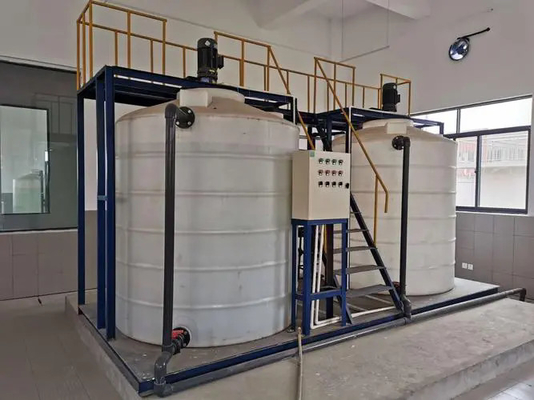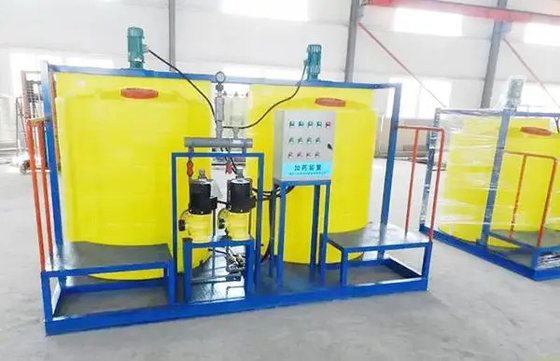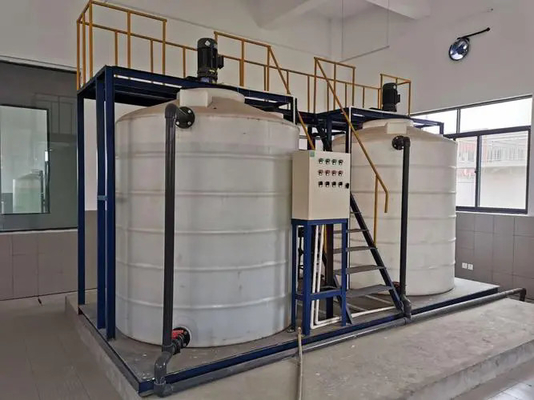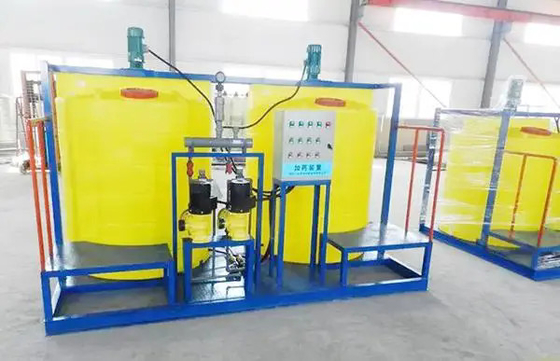-
Condensate Water Recovery Device
-
Reverse Osmosis Equipment
-
Fully Automatic Water Softener
-
Industrial Sand Filter
-
Water Supply Equipment
-
Chemical Dosing Device
-
Container Flipper
-
Container Loading and Unloading Machine
-
Truck Flipper
-
Electric Transfer Cart
-
Electronic Weighbridge
-
Mobile Loading Dock Ramp
-
Air Compressor Heat Recovery
-
Water Treatment Accessories
Tonglida PE Chemical Dosing System for Comprehensive Water Treatment 100T/H

Contact me for free samples and coupons.
Whatsapp:0086 18588475571
Wechat: 0086 18588475571
Skype: sales10@aixton.com
If you have any concern, we provide 24-hour online help.
x| Features | Compact Structure, Small Size, Low Noise, Stable Operation, Easy Installation, And Convenient Operation. | Origin | Taian, Shandong |
|---|---|---|---|
| Material | PE (Polyethylene), Stainless Steel | Application Fields | Mainly Used In Industrial Circulating Water Systems And Central Air Conditioning Circulating Water Systems |
| Brand | Tonglida | Product Information | Chemical Dosing Device, Full-process Physical And Chemical Water Treatment |
| Highlight | pe chemical dosing system,pe chemical dosing unit,100t/h chemical dosing unit |
||
Product Description:
The chemical dosing device can be customized to meet the specific requirements of users. This includes the option for one container with one pump, two containers with two pumps, online monitoring, and automatic dosing.
For the automatic dosing, the device can be set up according to the operational needs of the system. The dosing cycle, dosage amount, dosing time, and dosing frequency can be set for efficient operation.
During the system operation, the metering pump will automatically add chemicals and close at the designated time to ensure the desired chemical concentration within the system. When the drainage cycle begins, the metering pump will stop dosing. Once the designated time has elapsed, the metering pump resume operation to replenish the lost chemicals from the drainage.
The automated process ensures that the system maintains the desired chemical concentration, making it more efficient and reliable.
Features:
The equipment features a compact structure, allowing for it to take up minimal space. In addition, its small size ensures it is easy to store and transport.
The device operates with a low noise level, ensuring a quiet environment in which to work. It also promotes stable operation, allowing for consistent use over an extended period.
The equipment's design allows for easy installation, with minimal effort required to put it in place. Additionally, it boasts convenient operation, ensuring that anyone can use it without requiring extensive training or experience.
Technical Parameters:
The systematic deficiencies of traditional products that are based on a single equipment or component can be overcome through system-oriented design. This approach considers the system as a whole and develops integrated solutions that perform better than individual components. This leads to improved efficiency, cost-effectiveness, and overall performance.
The incorporation of advanced dosing technology in the design of water treatment systems utilizes innovative concepts that optimize the treatment process. By implementing the latest technological advancements, the treatment process can perform more efficiently, consume less energy, and provide higher quality output.
The modular and integrated design of modern water treatment systems allows for easy capacity and functionality expansion. The system can be scaled to meet increased demand, adapt to changing water quality conditions, or accommodate different purification goals. This provides users with flexibility and ensures the system's relevance over the long term.
The configuration of water treatment systems can be tailored to different water qualities and user requirements. With a variety of options for equipment and components, users can choose the materials, brands, and grades that best meet their specific needs. This flexibility allows for custom solutions that provide optimal results.
The availability of a wide range of equipment and components enables users to select the most suitable materials and technologies for the system. The equipment and components can be chosen according to environmental conditions, water quality characteristics, processing requirements, and other factors. By selecting the most appropriate equipment, users can maximize system performance and durability.
Water treatment systems offer multiple control modes to meet different control requirements. Automatic control options optimize the system's processes through constant monitoring and adjustment, while manual control options provide users with flexibility and the ability to intervene when necessary. The range of control modes provides users with the ability to choose the most appropriate control method for their individual needs.
Applications:
The thermal power generation industry requires various water treatment systems to ensure that their operations run smoothly. One of the essential systems is the boiler water treatment system. This system removes impurities from the water to prevent corrosion and scaling in the boilers. Without an efficient boiler water treatment system, the efficiency of the power generation process could be significantly reduced.
In addition to a boiler water treatment system, the thermal power generation industry also requires a circulating cooling system. The circulating cooling system helps to maintain a consistent temperature in various parts of the power plant. It works by circulating water through a series of heat exchangers to cool the equipment. An effective circulating cooling system helps to prolong the lifespan of the equipment and prevent breakdowns from overheating.
The chemical industry requires water treatment systems that are designed to handle the unique challenges of their operations. One of these systems is the chemical additive dosing system. This system uses chemicals to treat the water and ensure that it meets the required quality standards. The chemical additive dosing system can also be used in other industries such as medical, electronic, and more.
Another critical water treatment system in the chemical industry is the wastewater treatment disinfection system. This system is responsible for removing contaminants from wastewater before it is released into the environment. The disinfection process ensures that the water is safe to be discharged into rivers and other bodies of water without causing harm to the environment or wildlife.
Clean and safe water is essential for public health and safety. Disinfection is an important part of the water treatment process to ensure that water is free from harmful pollutants and bacteria. This process is used in municipal water supplies, swimming pools, water plants, sewage treatment, and domestic water in buildings.
Industrial processes often generate wastewater that requires treatment before it can be safely discharged. Disinfection is one of the crucial steps in wastewater treatment. It helps to eliminate harmful pathogens and microorganisms that may be present in the water. Additionally, disinfection systems are used in industrial circulating water to prevent contamination and ensure optimal operation of equipment.
Aside from the industries mentioned above, liquid dosing systems are also used in other related industries. These systems are designed to precisely control and monitor the amount of liquid added to a process. An example of an industry that uses liquid dosing systems is the food and beverage industry, where precise measurements are essential to maintaining product consistency and quality.






